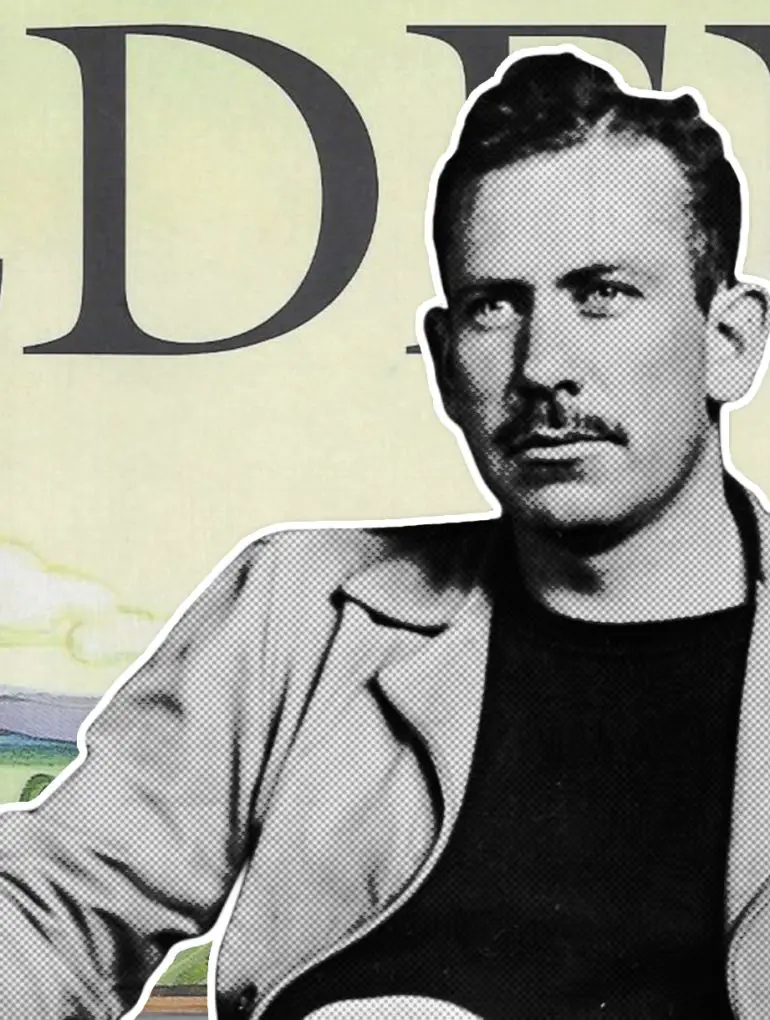“Nearly everything I have is in it, and it is not full. Pain and excitement are in it, and feeling good and evil thoughts—the pleasure of design and some despair and the indescribable joy of creation.”
The above quotation was drawn from the foreword provided by John Steinbeck for his novel East of Eden. Published in 1952, it parables the biblical tale of Cain and Able as experienced through the lens of two families as they struggle and triumph against a backdrop spanning the American Civil War to WWI, primarily in the setting of Salinas, California.
Following its release, the book fast became the bestselling novel in the United States, but at the time critics did not share the public’s enthusiasm. From its unorthodox narrative structure, to its towering characterizations, to its unfettered morality, the talking heads of the day panned East of Eden for being too grandiose for its own galoshes.
Perhaps we can chalk it up to yet another case of the age-old affliction that is ‘Being Ahead of the Times’, but today, East of Eden is considered Steinbeck’s magnum opus…
As seems too often to be the situation, readers then and now hailed the book for the very reasons the critics failed it. Perhaps we can chalk it up to yet another case of the age-old affliction that is ‘Being Ahead of the Times’, but today, East of Eden is considered Steinbeck’s magnum opus – ranking among the greatest titles one can find on the bookshelf. And I’d take things a step further, arguing that it is perhaps the most substantial literary achievement of all time.
Breadth of Allusion
There are many metrics by which the greatness of a literary work can be measured, but perhaps nothing is more indicative than the breadth of the wider human story that it aspires to wrangle into its tale. By this standard, East of Eden has certainly bitten off quite a mouthful of our homosapial chew.
In the novel, Steinbeck asserts that “We have only one story. All novels, all poetry, are built on the neverending contest in ourselves of good and evil.” And so he draws from many an iteration of that story to examine this theme.
The spine of the beast is, as mentioned, the myth of Cain and Abel. But Steinbeck gives it appendages from Confucius, the Jewish Talmud, the Meditations of Marcus Aurelius, Dante’s Inferno, Shakespeare, William James, Homer, and a slew of other literary giants.
There are many metrics by which the greatness of a literary work can be measured, but perhaps nothing is more indicative than the breadth of the wider human story that it aspires to wrangle into its tale.
And then there are the historical references. The plot of the story directly deals with the Civil War, the Mexican-American War, the American-Indian Wars, World War One, the conscription of Chinese railroad laborers, the inventions of the automobile and refrigeration, and more. These are in addition to the myriad historical tidbits that date back as far as the Greco-Persian Wars some 2,500 years ago.
Suffice it to say that in this book Steinbeck attempted to weave in an almost unprecedented and unparalleled echelon of allusion. It encompasses so much of our real world that it takes on a reality of its own.
Finessing Fact and Fiction
Speaking of the real world, one of Steinbeck’s greatest achievements with East of Eden involves how much of his own reality he blended in.
One of the most dazzling characters of the novel is Samuel Hamilton, an Irish-born inventor, philosopher, and patriarch of one of the story’s central families. Samuel is more than a character—he is in fact the author’s grandfather, John Steinbeck having been born in Salinas.
The factual references to Steinbeck’s actual family don’t stop there. He relates in detail how his mother became involved with the selling of war bonds during WWI, and tells a narratively unnecessary yet humorous story of how it won her a ride in a fighter plane (much to her chagrin, airplanes being a frightening invention at the time). At some point, one character actually walks past the Steinbeck house, and in another instance John Steinbeck brings himself into the story in a sort of meta/postmodern moment that wouldn’t become common in literature until several decades later.
Retained Relevance
A work of art might be impressive in the context of its creation, but if its meaning is lost on future generations so is its right to declare greatness. In other words, a truly great work will be as relevant one hundred years later as it was on the day it was made. East of Eden overwhelmingly meets this measure.
For example, Steinbeck describes how the American people—having forgotten the horrors of previous wars—looked to enter the First World War with somewhat excited trepidation. It was only after telegrams began arriving with the names of dead soldiers that reality bit down and the hunger for such foreign adventure began to wane.
This has been a terrible circumstance that we’ve seen play out again and again, perhaps most notably in the cases of Vietnam and the Iraq/Afghanistan wars of the 2000s. And now we’re seeing it again as the public weighs the pros and cons of a war with Iran. Steinbeck makes no specific judgements on the American amnesia toward past conflicts and our propensity to embrace new ones, but he does point out that our early, patriotic enthusiasm tends to wane as the body-bags come home to tearful families.
The relevance doesn’t stop there. Our wonder and fear at unfamiliar technological development, the pain of absent fathers, questions of progress in opposition to tradition, conflict between eastern and western societies, and of course the “one story” of good versus evil—these are matters that remain pressing today, and look to stay relevant for a long time to come.
Extraordinary Storytelling
Finally, East of Eden stands as literary supreme because, simply put, it’s a damn good story.
All we’ve discussed—the allusions, the reality, the relevance—all of it is crafted into a story that is thrilling and suspenseful; that is as hilarious as it is heartbreaking. In other words, it’s one hell of a yarn. A page-turner, to use the common parlance.
You care about the characters, and fear for them. You see what horrible things await them just around the corner, and you would warn them to watch out if you could. You celebrate their triumphs just as much as you feel their losses. You recognize yourself in their weaknesses and their strengths. Though living only on the page, they feel as alive as you or I.
…the allusions, the reality, the relevance—all of it is crafted into a story that is thrilling and suspenseful; that is as hilarious as it is heartbreaking.
The unfortunate truth is that while East of Eden is nothing short of a masterpiece, most people alive today will never read it simply because the multitudes don’t have the patience for masterpieces anymore.
Will you have the patience to reap its rewards? “Thou mayest” – two words, the power of which you’ll understand once you’ve traversed the tale.
I could go on, but to describe the magnificence of East of Eden in greater detail could fill a book of its own. Suffice to say that for the reasons I’ve explained above, and more, I believe it’s the greatest novel of all time.





